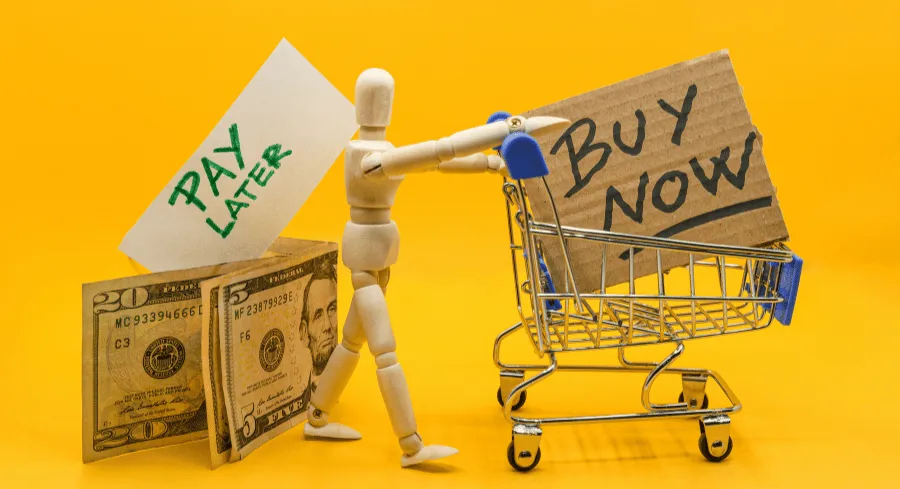The Burden of Buy Now, Pay Later: A Millennial Debt Dilemma
By Tahmid Hossain
September 11, 2023
Update on : September 11, 2023

In today’s world, the allure of Buy Now, Pay Later (BNPL) services is undeniable. With their promise of convenience and flexibility, these services have found favor among millennials. However, beneath the glossy surface lies a concerning truth – BNPL can potentially burden millennials with crippling debt and cast a shadow over the economy.
To address these concerns, the essay proposes three solutions: financial education, enhanced regulation and transparency, and the promotion of alternative payment options. While BNPL services offer convenience, they can potentially lead to increased debt among millennials and have negative impacts on the economy.
To mitigate these risks, it is crucial to prioritize financial education, implement stricter regulations, and encourage alternatives to BNPL services.
Impulsive spending
The ease of making purchases without immediate payment leads to unchecked spending. The click of a button triggers a rush of excitement as millennials indulge in impulsive purchases, driven by the allure of instant gratification.
The convenience of deferred payment entices them to buy trendy clothing and the latest gadgets, even when their bank balance is low.
Accumulation of debt
BNPL adds to the existing debt struggles faced by millennials, as student loans and rising living costs already weigh heavily on their shoulders.
While the monthly installments seem manageable at first, the accumulation of multiple purchases plunges them deeper into the clutches of debt, threatening their financial stability.
High fees and interest
Fees and interest charges associated with BNPL services can escalate the overall cost of purchases. A young professional seeking to furnish an apartment opts for BNPL to finance their purchases.
Unaware of the hidden costs, they soon discover late payment fees and high-interest rates, which escalate the total amount owed. The burden of debt becomes even more overwhelming, trapping them in a cycle of financial strain.
Financial instability
Heavy reliance on BNPL services creates a cycle of debt and financial instability. Struggling to manage their monthly installments, they sacrifice their ability to save, invest, and pursue their long-term financial goals. The stress of mounting debt hampers his overall financial stability.
Impact on credit scores
Late or missed payments on BNPL agreements adversely affect millennials’ credit scores. However, due to unexpected financial setbacks, they miss a few payments. As a result, their credit score takes a hit, limiting their access to future credit or loan opportunities. The dreams of homeownership or launching a business start to fade away.
Economic impact
An overreliance on BNPL services can trigger a rise in personal bankruptcies and defaults, potentially leading to an economic downturn. A significant portion of millennials trapped in unsustainable debt may shape the economic landscape.
Reports indicate a surge in personal bankruptcies among millennials due to mounting BNPL debt. As default rates rise, economic stability is threatened, impacting not only individuals but also the retail sector and overall economic growth.
Lack of financial education
Insufficient financial literacy exacerbates the challenges faced by millennials using BNPL services. Unaware of the potential risks and implications, millennials walk a tightrope without a safety net.
Now some steps can be taken to solve these problems. These fundamental changes can save a person’s financial life.
Financial Education: Empowering Millennials for a Secure Future
Promoting financial literacy equips millennials with the necessary knowledge for responsible borrowing. The light of knowledge illuminates a path towards informed financial decision-making.
Local schools and accessible resources offer comprehensive financial education, teaching millennials the art of budgeting, saving, and responsible borrowing. Armed with this knowledge, they can navigate the BNPL landscape more wisely, avoiding the pitfalls of excessive debt.
Enhanced Regulation and Transparency: Safeguarding Consumer Interests
Stricter regulations ensure transparent disclosure of terms, fees, and potential interest charges. The shield of transparency guards against hidden costs and unexpected surprises.
Regulatory bodies collaborate to enforce stricter guidelines, compelling BNPL providers to operate transparently. Clear disclosures empower millennials to make informed choices and understand the long-term financial implications of their decisions.
Encouraging Alternatives: Building Financial Resilience
Promoting a savings culture and exploring alternative payment methods offer a safer financial path. The foundation of financial resilience is laid brick by brick, fostering stability. Through awareness campaigns and financial planning initiatives, millennials are encouraged to save for their purchases or consider traditional installment plans through credit unions or banks. Transparent interest rates and fees provide a more secure financial pathway, nurturing responsible credit card usage and reducing reliance on BNPL services.
The growing popularity of Buy Now, Pay Later services poses a substantial threat to millennials’ financial well-being and the stability of the economy. Impulsive spending, debt accumulation, high fees and interest, financial instability, credit score impact, economic consequences, and a lack of financial education form the underbelly of this issue.
By prioritizing financial education, enforcing stricter regulations, and promoting alternative payment options, millennials can steer clear of excessive debt and forge a path towards financial security. It is only through these collective efforts that the burden of Buy Now, Pay Later can be alleviated, ensuring a brighter future for millennials and a healthier economy for all.
Read more: The Burden of Buy Now, Pay Later: A Millennial Debt Dilemma















